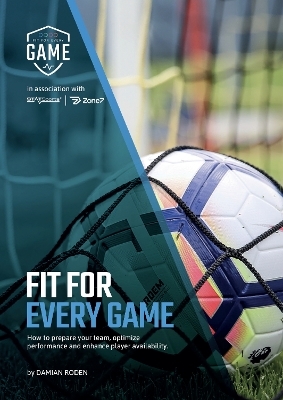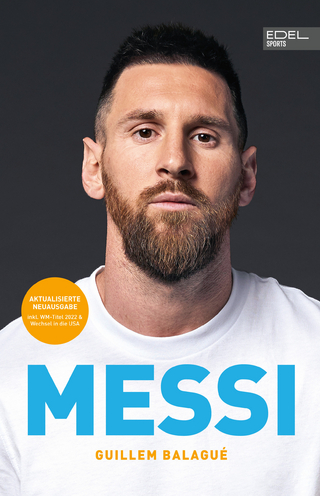
Fit For Every Game
fit for every game (Verlag)
978-1-5272-8596-5 (ISBN)
- Titel nicht im Sortiment
- Artikel merken
Fit for Every Game is the definitive guide to football training. Written by one of the top performance directors to emerge from the Premier League it is a bible for football training, providing clubs, coaches, practitioners and players alike with a comprehensive framework to optimise performance and enhance player availability.
Split into four main categories; Planning, Prevention, Conditioning & Regeneration, together with multiple sub-categories, Fit For Every Game consists of underpinning scientific principles, logical processes, real life examples and includes many practical tools to enhance performance from a technical, tactical, physical and psychological perspective.
PLANNING
Planning is an essential process to ensure that every effort is made to achieve the aim and objectives of your training philosophy. Good planning provides a long-term, medium-term, and short-term framework for the team and creates a reference point to then plan for each individual within the team over the course of the season. The term given to the process of planning every training session and every game each week over the course of a season is periodisation.
Periodisation is more commonly associated with an individual athlete preparing for competition. In this instance, the goal is to train in cycles in order to make significant training gains to peak at a particular event. Although this is more difficult in football, as there is a need to peak every game, there is no reason why the principles of periodisation cannot be implemented successfully in football.
Key learning outcomes of the planning chapter include:
A description of what periodisation entails.
A deep dive into Verheijen's football periodisation model, how to implement and progress over the course of a season.
How to plan a complete season effectively to include various cycles, varying training weeks and bespoke training sessions.
PREVENTION
Prevention is always better than cure and is a vital component of any training philosophy, particularly if you are to achieve the aim of having every player fit for every game. Whilst the dynamic nature of football itself places players at potential risk of injury, almost every injury is avoidable when common sense is applied - and combined with sound training methods.
Having a clear training model will undoubtedly reduce the risk of injuries if implemented correctly, but before commencing any form of team training, it is important that coaches and support staff alike do their due diligence, and consider any other aspects that will complement the approach in preventing injury and optimising performance.
Key learning outcomes of the prevention chapter include:
Type of tests to use to measure player progress, how and when to integrate them around training and games and how to make sense of the results.
Assessments that can be carried out quickly and effectively to establish player readiness that will help make informed decisions about player load.
Proactive preparation interventions and techniques to prime players for the demands and rigours or the modern game.
CONDITIONING
There are many different opinions regarding how teams should train and what a typical training week should consist of - all with merits and shortcomings. Providing there is sound rationale behind the philosophy, players remain injury-free, and maintain a high level of performance throughout the season, it may be argued that the correct approach is being implemented.
Regardless of the approach being implemented, it is important to consider the impact of every component of each and identify how players are likely to be responding each day and, therefore, what type of training should be implemented to fulfil the aims and objectives of the training philosophy.
Key learning outcomes of the conditioning chapter include:
Simple explanations of the demands of different training modalities when using Verheijen's football periodisation model and how to piece each component of training together competently.
How to recognise individuals in need of special consideration and how to manage them within a team setting.
An introduction to Frade's tactical periodisation model and how to piece each component of training together competently when using this approach.
REGENERATION
Whenever a player performs explosive actions, because the demand for energy is high, energy stores are rapidly depleted, muscles are damaged, and waste is produced that can cause further damage if it is not removed. Strategies that accelerate the regeneration process should, therefore, form part of every player's daily routine.
Furthermore, while such strategies are essential to keep all players free from injury, it is also important to consider the regeneration and rehabilitation of any players that sustain an injury in order to accelerate their recovery and ensure safe reintegration to training.
Key learning outcomes of the regeneration chapter include:
The importance of each nutrient on health and performance and how to prepare the perfect plate in terms of proportion and quantity around training and game.
Types or recovery modalities, how to optimise each protocol and understanding that every individual will respond differently to each stimulus.
How to implement a rehabilitation model from sustaining the injury to returning to training and match play.
Damian Roden is one of the most experienced and well-respected performance coaches to emerge from the English Premier League. After six years working with the FA of Wales, where he helped transform the delivery of coach education, Damian was recruited to the reputable sports science department at Bolton Wanderers FC by the well-respected Sam Allardyce. It is here that he began to introduce his philosophy, 'Fit For Every Game'. For a four-year period, and with an ageing squad of players, they were the only team outside the 'Big Four' teams to finish in the top eight of the Premier League every season, qualifying for European competition twice. Damian was then recruited as Head of Sports Science by Mark Hughes, first for Blackburn Rovers FC and then Manchester City FC. Hughes was one of the most forward-thinking British coaches at the time and, as with Allardyce at Bolton, steered both Rovers and City into European competition using the same methods. In 2010, having been headhunted by the Australian Football Federation to become their Head of Performance and help develop a well-established national team structure, an almost fatal deep-vein thrombosis (DVT), suffered during his first training camp with the Socceroos, brought the role to an abrupt end. However, the next year, the same role was presented to him with his home nation Wales, where he was reunited with colleagues Gary Speed (Bolton), Osian Roberts (FA of Wales), and Raymond Verheijen (Manchester City). Following an initial developmental period, Wales became the most improved team in the FIFA World Rankings, highlighting the progress made under Speed. Wales went on to reach the semi-finals of their first European finals tournament in 2016. Following the tragic end to close friend Gary Speed's tenure with Wales, Damian went back to the Premier League and spent four years with Stoke City as Head of Sports Science. During that time, Stoke had the fewest injuries of all Premier League teams. They also achieved the highest league position and points total in the club's history, for three consecutive seasons. In 2018, Damian then moved on to Seattle Sounders and as Director of High Performance, the club became MLS Champions, Western Conference Champions, and won the Cascadia Cup two seasons in a row. They had the best start, the best half-season in MLS history, and the best 25-game streak, including nine straight wins - additional MLS records. During Damian's tenure, Seattle recorded their highest points total, highest overall league position in years, and the highest player availability in the club's history. Most recently, Damian was the Director of Performance at RSC Anderlecht and continued to successfully implement his philosophy and influence a forward-thinking group of coaches, practitioners and players. In two seasons the club managed to re-establish itself as a force, secured European football and achieved the highest player availability in the league. Damian is now a Director and part-owner of the reputable 'Radcliffe Group' advising clubs and educating and developing coaches, practitioners and players alike.
INTRODUCTION
About the Author
Philosophy
Demands of the Game
PLANNING
1.1 Football Periodisation
1.2 Football Periodisation Model
1.3 Planning Process
PREVENTION
2.1 Screening and Testing
2.2 Readiness to Train
2.3 Preparation to Train
CONDITIONING
3.1 Team Periodisation
3.2 Individual Periodisation
3.3 Tactical Periodisation
REGENERATION
4.1 Nutrition
4.2 Recovery
4.3 Rehabilitation
APPENDICES
PLANNING APPENDIX
5.1 Conditioning Training Session Plans
5.2 Non-Conditioning Training Session Plans
5.3 Planning Tools
PREVENTION APPENDIX
6.1 Screening and Testing Protocols
6.2 Readiness Protocols
6.3 Preparation Exercise Library
CONDITIONING APPENDIX
7.1 Exercise Progressions
7.2 Position-Specific Fitness Exercises
7.3 Feature Article - Availability Equals Winnability
REGENERATION APPENDIX
8.1 Nutrition
8.2 24-Hour Professional
8.3 Feature Article - Football Rehabilitation
BIBLIOGRAPHY
| Erscheint lt. Verlag | 30.6.2024 |
|---|---|
| Mitarbeit |
Designer: Joanna Fletcher |
| Sprache | englisch |
| Maße | 210 x 297 mm |
| Gewicht | 2250 g |
| Themenwelt | Sachbuch/Ratgeber ► Gesundheit / Leben / Psychologie |
| Sport ► Ballsport ► Fußball | |
| ISBN-10 | 1-5272-8596-0 / 1527285960 |
| ISBN-13 | 978-1-5272-8596-5 / 9781527285965 |
| Zustand | Neuware |
| Haben Sie eine Frage zum Produkt? |
aus dem Bereich


